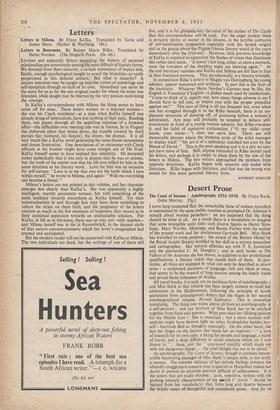Letters
Letters to Milena. By Franz Kafka. Translated by Tania and James Stern. (Seeker & Warburg. 18s.) Letters to Benvenuta. By Rainer Maria Rilke. Translated by Heinz Norden. (The Hogarth Press. 10s. 6d.) LETTERS and especially letters recording the history of personal relationships are notoriously among the most difficult of literary forms. We demand from them sincerity, a certain immediacy of impact and, finally, enough psychological insight to avoid the brutalities so easily perpetrated in this delicate context. But what is sincerity? A sincere intention may be caught up into the vortex of subterfuge and self-deception through no fault of its own. Immediacy can never be the same for us as for the one original reader for whom the letter was intended, while insight may be blurred by the very passion motivating the attempt.
In Kafka's correspondence with Milena the thing seems to have come off for once. These letters written to a married woman— she was his Czech translator—at a time when Kafka himself was already dying of tuberculosis, have lost nothing of their pain. Reading them, one passes through all the appalling minutiae of a hopeless affair—the difficulties over meeting (she was in Vienna, he in Prague) the, elaborate plans that broke down, the trouble created by third parties (her husband, his fiancée), the illness, the despair. It is all very much like a Kafka novel generating the same dream atmosphere and dream frustration. One description of an encounter with Czech officials at the frontier might have come straight out of The Trial. Kafka himself seems to have realised this similarity. He protested rather pathetically that it was only in dreams that he was so sinister, but the truth of the matter was that his life was willed by him in the same direction as his literary work. Love for him was an occasion for self-torture: "Love is to me that you are the knife which I turn within myself," he wrote to Milena, and again: "With me everything can become a threat."
Milena's letters are not printed in this volume, and her character emerges less clearly than Kafka's. She was apparently a highly intelligent, warmly passionate woman, but with something of the same tendency towards masochism as Kafka himself. Yet their communication in and through fear may have done something to relieve the strain on them both, and the poignancy of the letters consists as much in the few moments of happiness they record as in their continual aspiration towards an unattainable solution. For Kafka, in life as in literature, there was no way out—only respites— and Milena herself was to die in RavensbrUck, in the deepest circle of that univers concentrationnaire which her lover's imagination had created and anticipated.
But the modern reader will not be concerned with Kafka or Milena. The two individuals are dead, but the writings of one of them still live, and it is for glimpses into the mind of the author of The Castle that this correspondence will be read. For the eager student there is certainly plenty of matter in the dreams, in the terrible outbursts of self-humiliation (connected especially with his Jewish origin) and in the gossip about the Prague-Vienna literary world in the years immediately after the 1914 war. However, little previous knowledge of Kafka is required to appreciate the flashes of vision that illuminate this rather dark scene. ' 'It doesn't last long, either, at most a moment, soon the trumpets of the sleepless night are blowing again." At the end literature vanishes and Kafka and Milena are left face to face in their fractured universe. This, paradoxically, is a literary, triumph. In comparison Rilke's letters to Magda von Hattingberg, his young admirer, appear mannered and artificial. In part this is the fault of the translator. Whatever Heinz Norden's German may be like, his English is Translator's English—a dialect much used by intellectuals. "Come to think of it, sisterly one, how many things adverse to me I should have to tell you, to inspire you with the proper prejudice against me!" This sort of thing is all too frequent but, even when one has struggled through it to the Rilke beneath, there is an un- pleasant sensation of showing off, of posturing before a woman's admiration. Any poet will probably be tempted to behave' self- consciously in front of a young woman admirer, but Rilke overdoes it, and his habit of rapturous exclamation ("0 my child—your hands, your music—") does not serve him. There are still memorable phrases where the immense pride of the artist 'manages to display itself: "My art is of a splendour matched not even by the House of David." This is the poet speaking and it is a pity we can- not have more of him. Still, anyone interested in Rilke should read his letters, and perhaps it is unfair to place them by the side of the letters to Milena. The two writers approached the problem from opposite directions. Kafka began with sincerity and ended with literature. Rilke began with literature, and that was the wrong way round for this most personal literary form.
ANTHONY HARTLEY


































 Previous page
Previous page